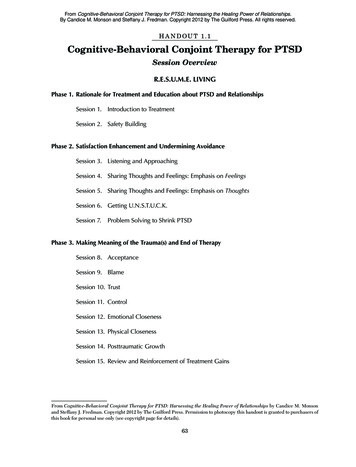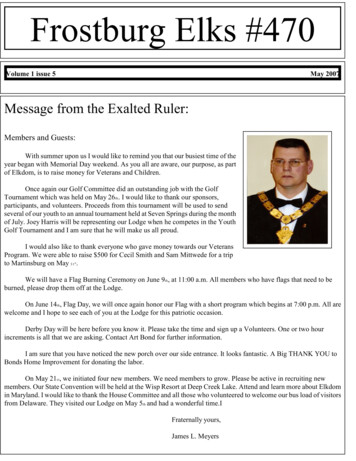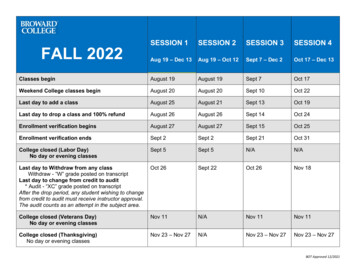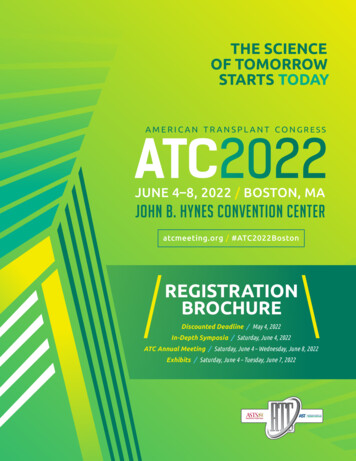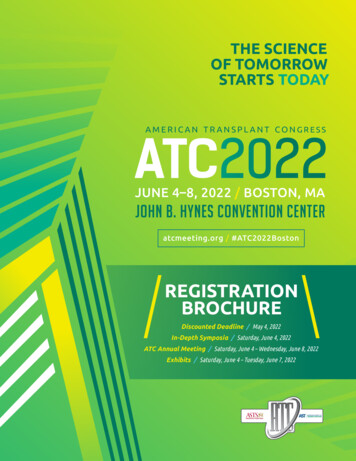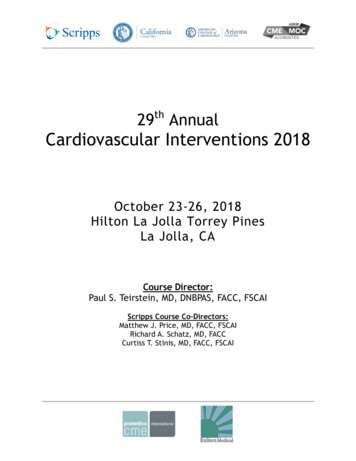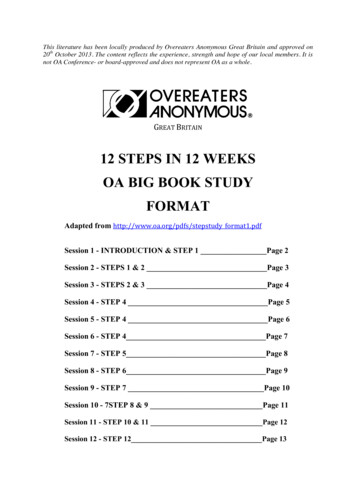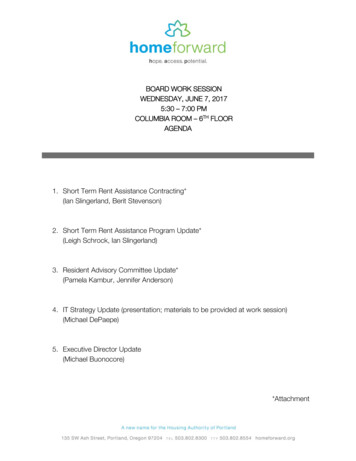
Transcription
BOARD WORK SESSIONWEDNESDAY, JUNE 7, 20175:30 – 7:00 PMCOLUMBIA ROOM – 6TH FLOORAGENDA1. Short Term Rent Assistance Contracting*(Ian Slingerland, Berit Stevenson)2. Short Term Rent Assistance Program Update*(Leigh Schrock, Ian Slingerland)3. Resident Advisory Committee Update*(Pamela Kambur, Jennifer Anderson)4. IT Strategy Update (presentation; materials to be provided at work session)(Michael DePaepe)5. Executive Director Update(Michael Buonocore)*Attachment
MEMORANDUMTo:From:Board of CommissionersDate:Ian Slingerland, Director ofHomeless Initiatives503.802.8370Subject:June 7, 2017Short Term Rent AssistanceContractingBerit Stevenson, Procurement andContracts Manager503.802.8541At the June Board of Commissioners meeting, Home Forward staff will requestauthorization to enter into contracts with community partners for the delivery ofemergency, short- and medium-term housing assistance. These contracts continue andexpand Home Forward’s role as administrator of the community’s consolidated ShortTerm Rent Assistance (STRA) program in alignment with the One System section of theStrategic Plan: We will leverage our role as the largest provider of affordable housing inOregon to improve collaboration and efficacy between systems impacting people inpoverty.ISSUEThe rent assistance contracts are administered by the Short Term Rent Assistance (STRA)team and include funding from Home Forward and funds contracted to Home Forward bythe City and County Joint Office of Homeless Services (JOHS), the Multnomah CountyDepartment of County Human Services (DCHS), and United Way.These contracts include funding allocations for housing assistance under multipleprograms. Consolidating funding for these multiple housing assistance programs intosingle contracts with our community partners increases efficiency for Home Forward, ourfunders and our contracted partners. These contracts will include funding for:
Short Term Rent Assistance Program: STRA provides flexible emergency andshort-term housing assistance to prevent and end homelessness. Home Forwardand STRA funding partners are currently evaluating twenty responses to the RFP toselect providers for the STRA program. This RFP process will select STRAproviders for the next five years. Primary funding for STRA comes from the CityCounty Joint Office for Homeless Services (JOHS), the Multnomah CountyDepartment of County Human Services (DCHS), United Way and Home Forward.Providers of STRA services selected through the recent formal procurementprocess will be presented to the June 20, 2017 Board of Commissioners meetingfor approval. Schools and Housing Stability Fund (SHSF): SHSF provides flexible emergency andshort-term housing assistance to support increased student stability at select highpoverty and high-mobility schools. Targeting and providers for the Schools andHousing Stability Fund are determined in consultation with the JOHS and DCHS inorder to align with capacity and programming in Multnomah County’s SchoolsUniting Neighborhoods (SUN) service system. Funding is provided for SHSF byJOHS and/or DCHS. Funded providers for SHSF also deliver assistance throughthe STRA program. Alder Elementary School-Based Rent Assistance Program: This program providesHome Forward’s flexible Moving to Work resources for emergency and short-termhousing assistance to support increased student stability at Alder ElementarySchool in alignment with “Dreamer School” resources and partnerships facilitatedby the I Have a Dream Foundation of Oregon. Human Solutions is the long-timeregional family stabilization services provider in Multnomah County’s SUN ServiceSystem for Alder Elementary, and delivers housing assistance and family stabilityservices through our Alder School-Based Rent Assistance program. HumanSolutions also delivers assistance through the STRA program. Earl Boyles School-Based Rent Assistance Program: This program provides HomeForward’s flexible Moving to Work resources for emergency and short-term housingassistance to support increased student stability at Earl Boyles Elementary Schoolin alignment with the Early Works program resources and partnerships facilitated bythe Children’s Institute and David Douglas School District. Immigrant and RefugeeCommunity Organization (IRCO) is the SUN Service Provider for Earl Boyles and2
delivers housing assistance and family stability services through our Earl BoylesSchool-Based Rent Assistance program. IRCO also delivers assistance throughthe STRA program. Economic Opportunity Program (EOP): EOP aligns Home Forward’s flexible Movingto Work resources for emergency and short-term housing assistance withpopulation-specific and culturally specific family stabilization resources, careercoaching services, and training and employment services. Human Solutions deliversrent assistance for participants receiving EOP services across eight organizations. Homeless Family System of Care (HFSC) Mobile Housing Team (MHT): HFSC is acollaboration of providers supporting families experiencing homelessness inPortland and Multnomah County. HFSC provides flexible short- and medium-termhousing assistance to families leaving homelessness using a multi-agency team ofmobile housing specialists (MHT) and a system of coordinated entry that allows forthe prioritization of highly vulnerable families using a shared assessment tool andopen data sharing. MHT grew out of Multnomah County’s homeless family systemredesign process in 2013 and utilizes providers from the DCHS SUN System. TheJOHS provides Home Forward with the funding for the flexible housing assistancedelivered by the MHT. The flexible housing assistance administered by HomeForward aligns with service capacity in the MHT. All but one of the MHT providersalso deliver assistance through the STRA program. Portland Homeless FamilySolutions is an MHT provider, but not a STRA program provider.Funding for these STRA programs is determined annually, for contracts that run July 1through June 30. Funding amounts from Home Forward are determined through HomeForward’s budget. Funding amounts from JOHS and DCHS are set through the budgetprocesses at Multnomah County and the City of Portland, and are often not determineduntil mid-June (for the contract year beginning July 1). Once funding amounts aredetermined, Home Forward must be able act quickly to contract funds with providers inorder to ensure uninterrupted services.The anticipated funding for these programs for the contract year running July 1, 2017 toJune 30, 2017 is approximately 7 million.3
At the June Board meeting, approval will be sought for annually renewed contracts for fiveyears with selected providers, including the MHT provider Portland Homeless FamilySolutions, for the above services. The annual amount of these contracts will vary withprovider; contracts for the above services for the current year range between 15,000 andjust over 1 million. Final annual contract amounts will be determined by Home Forward’sSTRA team and will be based on Home Forward’s annual budget and amounts contractedto Home Forward by partners. The final list of selected providers, including PortlandHomeless Family Solutions, will be available upon the completion of the STRA programRequest for Proposal (RFP) process.4
MEMORANDUMTo:From:Board of CommissionersLeigh Schrock, ProgramSupervisor503.802.8364Date:Subject:June 7, 2017Short Term Rent AssistanceProgram UpdateIan Slingerland, Director ofHomeless Initiatives503.802.8370This report discusses Home Forward’s role as a funder and administrator of emergency,short- and medium-term housing assistance in alignment with the One System section ofthe Strategic Plan: We will leverage our role as the largest provider of affordable housing inOregon to improve collaboration and efficacy between systems impacting people inpoverty. This report is informational only and no Board action is required.Program SummaryThrough the programs administered by Home Forward’s Short Term Rent Assistance(STRA) team, contracted providers deliver housing assistance to households who areexperiencing homelessness or at-risk of homelessness in Multnomah County. HomeForward contracts funding for the provision of short-term housing assistance andassociated costs to 18 social service providers. Last contract year, programs in the STRAsystem served 2,583 unique households.In the current 2016-17 contract year, programs in the STRA system consolidate 10.6million in funding for short-term housing assistance primarily from five funding partners: theCity and County Joint Office of Homeless Services, Multnomah County Department ofCounty Human Services, Home Forward, United Way and City of Gresham. Thesefunders provide STRA with a combination of local funding and state and federal resourcesthat Home Forward then contracts with providers. Home Forward contracts with each
provider a portfolio of resources designed to allow the providers maximum flexibility totailor STRA assistance to the unique needs of the people they serve.Programs in the STRA system fund the following intervention activities: HomelessPrevention assistance, Permanent Housing Placement assistance, and Crisis “Shelter”Services in the form of motel vouchers. STRA resources can be used for financialassistance with rent, rent arrears, mortgages, motel vouchers, application fees, depositsand move-in expenses, housing debt, and limited “non-leasing” expenses needed toeliminate barriers to housing. Assistance is generally limited to 24 months in duration foreach participating household.STRA system funding is designated to various community providers with the goals ofachieving a balance of available services across the community and aligning with existingcapacity to deliver assistance and provide supportive services. Targets for STRA fundinginclude: Family composition type- Families with children, unaccompanied youth and adulthouseholds without children Communities of Color disproportionately experiencing homelessness and housinginstability Domestic Violence Survivors Special Populations: the Medically Needy, Street Outreach, and Special NeedsThe race/ethnicity/origin of people served by the STRA system in the 2015-16 ContractYear is included below. Numbers may be an over count of unique participants as peoplemay report multiple responses.Race/Ethnicity/Origin- STRA Programs Contract Year 20152016African2.2%Asian2.6%Black/African American21.4%Latino/Hispanic21.5%Middle Eastern1.1%Native American/Alaska Native10.4%Native Hawaiian/Pacific Islander1.9%Slavic2.2%White36.9%Declined to Answer0.2%21Excludes Domestic Violence Pool (includes everything else)2 Excludes Mobile Housing Team (Homeless Family System of Care). Includes the Domestic Violence Pool.
Strengths and ChallengesBegun in 2006, the STRA program has been a groundbreaking model for providinghomeless placement, eviction prevention and emergency housing services. After elevenyears in operation, the STRA program continues to grow in size and scope. Sinceinception, the amount of STRA funding has grown 500%.A key to the success of STRA is the case management provided by our non-profit partneragencies. STRA agencies work closely with clients to regain and maintain housingstability, using limited STRA funds wisely. Historically, the average STRA household1receives 3.5 months of rent assistance at an average cost of 2,544.While individual STRA programs have different focuses with regard to demographics andservice alignment, all STRA programs use a common housing retention outcomemeasurement. The STRA system outcome goals are related to housing stability after postassistance:o 90% housing retention at 3-months after end of assistanceo 80% housing retention at 6-months after end of assistanceo 70% housing retention at 12-months after end of assistance2015-16 Outcomes are in line with, and indeed exceed, program goals:2o 92% housing retention at 3-months after end of assistanceo 88% housing retention at 6-months after end of assistanceo 84% housing retention at 12-months after end of assistanceThe STRA system’s greatest challenge is that demand for the resources far exceeds thesupply. The system expends the full grant awards each year, while need in the communityremains high. In this context, together with our STRA funding and contracted partners, wecontinue to wrestle with the question of access—what is the most equitable and effectivemodel for creating access to STRA for families in need of assistance? Current programs inthe STRA system largely align STRA resources with clients who are receiving othersupportive services to stabilize the family—the “front door” for assistance is throughsupportive services. We will continue to engage with our partners to discuss the pros andcons of the current models of access utilized within the STRA system.Another growing challenge for STRA is the pace at which rents continue to rise faster thanincomes in Multnomah County. Given STRA’s goal of achieving long-term housing stabilityfor families by using a limited amount of assistance, we are closely monitoring the effectsof rising rents on our STRA families and their housing retention outcomes.31Excludes Domestic Violence Pool (includes everything else)2 Excludes Mobile Housing Team (Homeless Family System of Care). Includes the Domestic Violence Pool.
Short Term Rent Assistance ProgramLeigh Schrock, Program Supervisor503-802-8364June 2017
Program snapshot
What is STRA? Short term and emergency housing assistance toend and prevent homelessness in MultnomahCounty Duration: Generally limited to 24 months or less Shorter than Vouchers, but used in private market Outcome goal is long-term housing stability
Reducing Homelessness: A Balanced ApproachHousing PlacementPreventionSTRASTRAStreet to HousingShelterStreetShelter toHousing
How STRA Works:Funds from:-Joint Office-Mult. Co. Dept.Human Services-Home Forward-City of Gresham-United WayHome Forward’sSTRA Program18 CommunityProviders
18 Providers
Eligible Activities Rent Security Deposits Rent arrears Motel vouchers Housing-relateddebt Mortgageassistance Application fees Move-in fees Limited nonleasing expenses(utility assistance,storage, movingcosts, IDs)
FY 2015-16 Impact 2,583 households assisted (not countingDomestic Violence)LS11 Avg. rent assistance per household: 2,376 Avg. all assistance per household: 2,085(includes people not receiving rent assistance)
Slide 8LS11 2,376 avg. per household includes rent rent arrearsLeigh Schrock, 5/30/2017
2006 – June 2016 13,716 households assisted (notcounting Domestic Violence)LS5 Avg. length of rent assistance: 3.5 monthsLS12 Avg. rent assistance per household: 2,544 Avg. amount all assistance per household: 2,304 (includes people not receiving rentassistance)
Slide 9LS53.5 months avg. doesn't include DV. Includes rent rent arrears.LS12 2,544 is avg. including rent rent arrearsLeigh Schrock, 5/30/2017Leigh Schrock, 5/30/2017
STRA is Cutting-Edge
STRA is Cutting-Edge
Home Forward's role Contract funding to 18 Community Providers Monitor and evaluate Providerperformance/compliance Design and implement funding programs Provide technical assistance and training onfund administration Provide 1.8 million of our MTW funds(including Admin)LS1
Slide 12LS1 1.8 million MTW includes all Home Forward items on Ian's Budget sheet (AFP, HF-STRA, EOP, Earl Boyles, MIF Alder, all PILOT, EFSP)Leigh Schrock, 5/28/2017
LS8STRA Funding 10.6 million in funding Up from 1.9 million in 2008-09
Slide 13LS8 10.6 million is FY16-17 total on Ian's budget sheet (includes every fund this year)Leigh Schrock, 5/30/2017
LS9FundingPercentage of STRA dollars by Funder(of 10.6 million in 2016-17 – includes Admin to STRA Agencies)United Way,Gresham,1%0.3%HomeForward, 17%Mult. CountyHuman Svcs.,25%Joint Office,56%
Slide 14LS9 10.6 mil. from Ian's budget sheet - includes every fundLeigh Schrock, 5/30/2017
STRA FundingIncludes 5.6 in funding for “historic” STRA program, and 5million in funding for targeted short term housing assistanceprograms leveraging STRA infrastructureSTRA Contract Spending Goals: Homeless Prevention Assistance (65%) Permanent Housing Placement (25%) Crisis “shelter” services in the form of motel vouchers(10%) Other programs include housing placement for familiesexperiencing homelessness, veterans assistance, and schoolbased assistance.
Targeted Funds GrowTargeted Funds 47% of Current STRA 12,000,000 4,995,163 10,000,000 8,000,000 6,000,000 4,000,000 598,206 5,589,370 2,000,000 2,884,443 02010-11STRA RFP2016-17Targeted Funds including Mobile Housing Team
The Need for STRA:211: Calls and Web Searches forHousing 0FY2014-15FY2015-16Rent Assistance and Deposit AssistanceFY2016-17 (Q1 - Q3only)All Housing Assistance
Participant storyPaul* had been living on the streets for years. He hasHepatitis C and mental illness and made frequent visits tothe emergency room. Our STRA partner agency, JOIN,helped Paul locate an apartment and used STRA funds topay the rent for 12 months. Now, JOIN is helping Paul tosecure SSDI benefits. Since he’s been inside, Paul hasonly been to the hospital once in 6 months. His JOINcaseworker says, “This housing opportunity quite literallysaved Paul’s life”.
Participant story Becky is a mother of 3. Her daughter was recentlydiagnosed with autism. Without resources toprovide appropriate care for her daughter, Beckyhad to quit her job to become a full-time caregiver.Central City Concern used STRA to pay the rent forseveral months and avoid eviction for this family.Now, Becky is on the waiting list for childcareassistance through DHS. She plans to return towork as soon as she has a care provider for herdaughter.
OutcomesHow many households are still housed afterassistance ends?Goal2015‐163 months after assistance90%92%6 months after assistance80%88%12 months after assistance70%84%* excludes Homeless Families System of Care. Includes Domestic Violence Pool.
SystemStrengths &Challenges
System Strengths Jurisdictions working togetherFocus on system-wide outcomesAdministrative ease for ProvidersHome Forward’s STRA administrativeinfrastructure
System ChallengeThe Average STRA Agency Can Serve 10% of its "STRA Seekers” per Year1321324Avg. Calls per AgencyAvg. Capacity per Agency
System ChallengesDemand Vs. Supply: “We get 85-100 calls per week forhousing assistance.”- Northwest PilotProject “We receive about 6,000 calls a year forSTRA.” – Human Solutions
System ChallengesGiven the High Demand for STRA:What is the appropriate Access Point? Allign with Services vs. Open Door Ongoing, evolving discussions
Challenge: Rents
Questions?
MEMORANDUMTo:From:Board of CommissionersDate:Pamela Kambur,Community RelationsManager503.802.8508Subject:June 7, 2017Preparations for Annual ResidentAdvisory Committee (RAC) UpdateThis presentation is a preview of the Resident Advisory Committee’s upcoming report tothe board and is informational only. No board action is required.ISSUEThe Resident Advisory Committee (RAC) meets on the 2nd Tuesday of each month todiscuss policy issues that impact a wide cross-section of Home Forward residents andparticipants. At least once each year, RAC members plan and present a report to theBoard of Commissioners. They are currently working on their presentation which will serveas your “mission moment” at the July BOC meeting.RAC members have focused on three major topics since their work year began inSeptember: 1) improved agency-wide communications; 2) legislative advocacy foraffordable housing; and 3) improved services for residents. These issues are firmly alignedwith the agency’s strategic plan and RAC members are working closely with staffmembers to complement existing work related to the strategic plan.Plans are also underway for another recruitment effort to ensure a full committee resumeswork next September. Approximately eight to ten new members will be added in order tobegin September with a full committee of 18 members. After applications are reviewed bystaff and current RAC members, one-on-one interviews all candidates to ask questionsand for us to get to know each other. Staff provide a summary of recommendations to the
executive director and board chair prior to their meeting as a group to confirm theirappointment. New members are encouraged to come to the September board ofcommissioners meeting for introductions.2
Community Organization (IRCO) is the SUN Service Provider for Earl Boyles and . 3 delivers housing assistance and family stability services through our Earl Boyles School-Based Rent Assistance program. IRCO also delivers assistance through the STRA program. Economic Opportunity Program (EOP): EOP aligns Home Forward's flexible Moving to Work resources for emergency and short-term housing .

